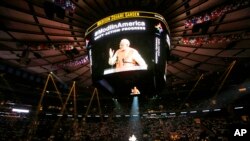India’s Prime Minister, Narendra Modi, meets President Barack Obama at the White House Monday in what the Obama administration said is an effort by both countries to build a new strategic alliance.
Modi was greeted in New York Sunday by enthusiastic members of the Indian diaspora.
Obama will host a private dinner Monday evening for the Indian prime minister during his first state visit since his Hindu nationalist Bharatiya Janata Party (BJP) won parliamentary elections in a landslide in May.
That will be followed by bilateral discussions Tuesday that White House spokesman Josh Earnest called an effort to expand and deepen the U.S.-India strategic partnership.
"It is a partnership that is highly valued by this country and by this White House. We will discuss ways to accelerate economic growth, bolster security cooperation and collaborate on activities that bring long-term benefits to both countries and the world," Earnest said.
"We’ll focus on regional issues, including current developments in Afghanistan, Syria and Iraq, where India and the United States can work together with partners toward a positive outcome. The president himself looks forward to working with the prime minister to fulfill the promise of the U.S.-India strategic partnership for the benefit of citizens in both our countries," Earnest added.
'Defining partnership'
Obama administration officials have called the bilateral relationship "a defining partnership of the 21st century."
The United States has expressed support for Modi's economic reforms and will offer assistance in counterterrorism and energy security.
The Indian prime minister is also expected to meet with corporate leaders from companies including Google, IBM, General Electric, Goldman Sachs and Boeing in a bid to lure foreign investment.
RAND Corporation India analyst Rafiq Dossani said Modi’s message to them is simple: India is open for business.
"[Modi will say] that the red tape that historically almost defines doing business in India is a thing of the past. There are things here in which he is promising that he has yet to deliver on, but his intent is to deliver a strong message that things will change," Dossani said.
IHS Global chief economist Rajiv Biswas said India is looking to the United States to help New Delhi modernize its armed forces and develop its domestic defense industry.
"For Prime Minister Modi, the key priorities during his visit to the U.S. are the economic aspects, to build up the trade and investment relationship, to persuade U.S. multinationals that India is on the rise again, the economy is on the mend, that he is going to be much more dynamic than the previous government in dealing with new approvals for investments," Biswas said.
"And also to strengthen defense cooperation with a number of major negotiations now very well advanced particularly for a deal of $2.5 billion U.S. dollars for the Indian military purchase of Apache and Chinook military helicopters, but also other major deals are under negotiation as well," he added.
Biswas said India represents one of the world’s fastest-growing consumer markets, with total consumer spending forecast to rise from $1.1 trillion last year to $4.3 trillion by 2023.
Bilateral trade reached $63.7 billion in 2013, slightly below what India traded with China.
But, Biswas pointed out, when trade in services is factored in, the U.S.-India trade relationship actually totaled about $94 billion last year.
Thousands cheer Modi
Sunday, Modi received an enthusiastic welcome from thousands of Indian-Americans in New York’s famed Madison Square Garden.
"America is the oldest democracy in the world," Modi said. "India is the biggest democracy in the world. The entire world has come and settled down in India and the people of India have gone and settled down in the entire world."
One of those in attendance, Sonny Khurana, called the new prime minister a new type of leader.
"He spoke like a world leader. That’s been lacking in most all of India’s leadership in the past. We’ve had politicians, but no genuine world leader," Khurana said.
"One-sixth of humanity definitely deserves a person who can talk and kind of get a whole movement started, and he’s the man. He’s the man for the job," Khurana added.
The RAND Corporation’s Dossani said Modi's trip is personally important to burnish his world standing in light of the controversy surrounding the revocation of his U.S. visa in 2005 in the wake of sectarian violence in Gujarat State during his tenure as chief minister.
Dossani said that if Modi can create a good impression in America, it improves his standing elsewhere, thus making this trip more important than his visits to Japan and China.






